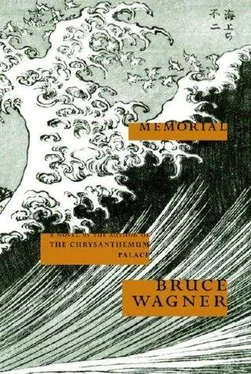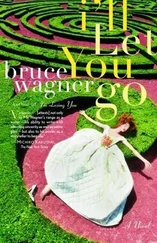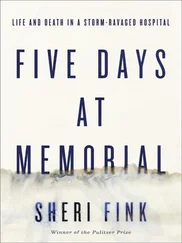“So what?” he said, ever the diplomat. “Why make a fuss? Warren Beatty does it. Whenever he gets photographed, he brings his own lighting people. What’s the problem?”
“It’s so sad.”
“Zaha Hadid had it on Charlie Rose.”
“Oh, bullshit.”
For a moment, he got her attention.
“I know you have a thingie about Zaha.”
She turned the channel in antic disgust.

THEY had originally met at some welcome-to-the-neighborhood fete for Frank Gehry. Pradeep made frequent trips to LA; when his wife wasn’t visiting her parents in Delhi, she preferred to remain in the Bay Area with their 2 young children. There was an instant attraction between them which Joan thought weird, from her end anyway. He had Bollywood good looks, or at least that was her idea, because she’d never seen a Bollywood film. Not really her type.
The party was at Dennis Hopper’s metal house in Venice. There were a lot of artists there (Hopper considered himself one of them) — both Eds: Moses and Ruscha; Robert Williams and John Baldessari. In profile, Ruscha’s wife, Danna, looked like an empress on a Roman coin. Bono and Kirsten Dunst and the 2 Germans, Wenders and Herzog, and even a Caltech Nobelist. Joan just felt stupid. She was starstruck and her usual engine of contempt had been flooded — she stalled out and got drunk. Funnily, she found herself as attracted to Gehry as she was to Pradeep, and spent half the night with an eye on both. Barbet wanted to introduce her to Frank but Joan was too filled with self-loathing. What was the point? Gehry was gemütlich and gnomishly, gnostically bewitching, a wizard-changeling sitting on a bus bench at Fairfax and Beverly — a wolf in gefilte fish clothing. He was like a creature out of Bellow, I. B. Singer, or whatnot. He showed off a watch he designed, with his name etched on the back, and an aggressive starlet asked if she could wear it awhile. He graciously acceded. An hour or so later, with Jack Benny timing, he said, “So, can I have my watch back?” The tough little gamine didn’t look like she wanted to part with it just yet and that’s when Gehry gallantly said, “You can have it.”
The rest of the evening, attended by his gorgeous young son, he told everyone, in that nearly imperceptible voice, how the famous gal had stolen his watch, words modulated like a deadpan imp, he got a great kick out of it, which made it all right. Still, Gehry was hard to read. He could look right through you and that scared her. He jetted around the planet kibitzing like a cosmic potentate, and Joan noticed how his face could darken into impenetrability as easily as becoming mawkish at the mention of a recent visit to his old Canadian grade school where they sang to him the national anthem. Once, cheating on Larry King, she watched pre-heart attack Charlie Rose. (Letterman was the pioneer. Months later, Joan saw Rose on Larry the very night before Larry guested on Rose —it was like swapping spit. The whole near-death thing disgusted her. Charlie Rose was about as near death as Karl Rove was to enlisting. Cardio-Charlie was telling Larry — they shared the same Manhattan surgeon — how he was in Syria having shortness of breath and how he got their doctor on the line and their doctor said you better get your butt to the City of Light and Charlie of course happened to have an apartment in Paris, and happened to know Bernard-Henri Lévy, and Bernard-Henri Lévy happened to know a cardiologist willing to see him at 7:30 Friday night, and the cardiologist happened to know the best mitral valve man in the world who happened to be out of the country but happened to return on Monday to give Charlie the once-over. When Larry asked how the trip back to the States was after his recovery, Charlie said fine, a friend from New York sent a jet, and there was a doctor onboard. Joan kept thinking, what if you’re some poor schmuck with 4 kids and a fatass wife in tow on some National Lampoon European Vacation and you’re having chest pains and shortness of breath? What if you’re not motherfucking pigvalve man-about-town Charlie Rose? ) His guests were Gehry, Renzo Piano, and that relic Ada Louise Huxtable. Piano was like an Italian Thom Mayne, a bad actor playing an arrogant duke (his dukes were always up); Huxtable, a doyenne courtesan, mummified madame out of 120 Days of Sodom, some Edith Head — wardrobed Fountainhead buzzard. Charlie Rose was an incorrigible architect buff and wanted the whole world to know it. (He’d even done a whole hour with David Childs, who looked and talked like a cousin of BTK. CR said, “David, I’ve had the ‘signature’ architects on this show — you know who they are. But here’s what the world says about David Childs: 1) You’re the guy who gets the building built; 2) You get along remarkably with your clients and patrons….” Joan hung on her chair, waiting for number 3: You are a bloodless bureaucrat without talent or vision —but the unctuous host never delivered.) Rose looked like a ghoul with a hairpiece, a cross-dresser doing roadshow Guys and Dolls; those idiotic gesticulations of faux passion and creepily orchestrated adolescent enthusiasms made Joan cringe. (Other times, he’d morph into a rouged-up 2-bit Casanova.) The frank Piano player got the architects to shoot the usual no-brainer shit, the Bilbao Effect, all that deadly dialectic about museums servicing art or museums as art-in-themselves, Rose and Huxtable with their heads so far up the celebrated men’s asses — Charlie and the Chocolate Factory! — you could practically see their scalps crowning in Frank and Renzo’s mouths. Renzo had his head up Frank’s ass (the ultimate museum add-on) all the while pretending he wasn’t a man to suck up to anyone but G-d — how it nauseated her! Piano actually said, “I am a craftsman — I do work with my own hands, so I never take on too much. Yes, we have 100 people in the office, but…”
Gehry was the only one who got away untainted — that was the true Bilbao Effect, in action!
SEX with Pradeep had a quality of innocence, something lacking in her connection to Barbet. The counsel was all feeling; with Barbet, she was always being hustled or hustling. That was exciting too, though not in the long run.
“Tell me what you know about Lew,” she said after room service came. She tore into her veal as he spoke.
“An unusual man.”
“Is he dangerous?”
“He would have to be. A bit. No?”
“Did he beat up his wives?”
“Not that I know of!”
“How close was he to his brother?”
“Very.”
“What exactly were they doing in India? The brother and wife?”
“Bumming around, in their fashion. On the way to Sri Lanka. The Maldives. They weren’t the Phi Phi-Phuket sort. They’d have been better off if they’d wound up in the Maldives during the Wave. They found them both in a tree, you know — a sundari. The water pushed them up. It was a ‘spirit’ tree, with a beautiful yellow sash around the trunk. I have a digital photo.”
“What is that? A spirit tree.”
“It’s special. It’s ‘recognized’ by the villagers. The monks leave offerings for it, you know, food and water. This tree took the Freibergs in its arms, so to speak. They just hung there. Esther was still wearing her jewels. No one would go near them; they did not retrieve the bodies. It’s actually quite beautiful. In its fashion.”
“What happened?”
“Relief workers finally got them down. There were elephants all around, clearing debris. Even the elephants stopped what they were doing to gather there! Around the spirit tree. Amazing. I was told this story by a very straight-arrow guy who works for Guerdon, so no one made it up. It is not an urban legend. Did you know Lew wanted to cut the tree down and bring it to Napa to replant? I think he wanted it for the Memorial. The government hasn’t allowed it (so far!) because those kind of trees are nearly extinct. He asked me to intervene — I made a few inquiries, but they won’t. They never will. Which is good for you, my Miss Joan, because if they’d allowed it, poof! There goes your Mem. But maybe Mr Koolhaas, with his delinquent Dutch charm, will convince them yet!”
Читать дальше













